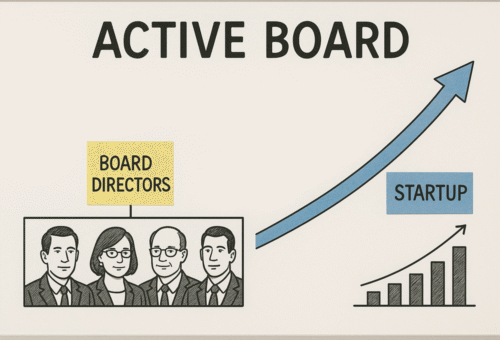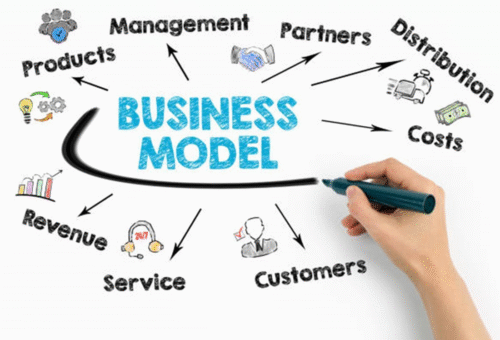
Charting the Course: A CFO Framework for the Young (Business Age) Entrepreneur.
To achieve sustainable growth, an entrepreneur must build a solid business foundation. This process requires more than just having a vision; it involves working within a practical, scalable framework focused on the drivers of growth and sustainability.
Vision & Mission Statements
“If you don‘t know where you are going to, you’ll probably end up somewhere else“ – Yogi Berra.
A well-crafted Vision and Mission Statement is crucial for every business, especially young ones, as they act as a compass guiding the business‘s growth and ensuring every team member works towards a common goal.
The Vision Statement articulates the aspirational future of the business! What does the company wantto achieve at the end of it all? It provides a long-term focus for the young company if properly written, preventing it from getting bogged down in short-term operational details.
The Mission Statement outlines the business’s core purpose: what it does, how it does it, and who it does it for. For a young company, it helps it to clearly understand its present activities and guides day-to-day decision-making.


Align Personal Values and Beliefs with the Vision & Mission of the Business.
Legally, a business is a separate entity from its owner. However, as a fundamental pillar for long-term success, sustainability, and impact, an entrepreneur’s values and beliefs must align with their company’s vision.
When the business vision resonates with your core values, your passion for the work becomes authentic and infectious. This intrinsic motivation fuels you through the inevitable challenges and setbacks of entrepreneurship.
A business rooted in the entrepreneur's values has a more precise and compelling brand identity. The "why" behind the company is evident and resonates with like-minded customers who share those values.
Value-driven businesses often focus more on long-term sustainability and impact than short-term gains that might compromise their core principles.
When the entrepreneur's values permeate the business, it fosters a strong and cohesive company culture based on shared beliefs and principles. This leads to higher employee engagement, loyalty, and productivity.
When your business aligns with your values, you feel more meaning and fulfillment in your work.
In summary, aligning an entrepreneur’s values and beliefs with their business vision is a strategic imperative. It provides a strong foundation for authenticity, ethical conduct, impactful decision-making, talent attraction, resilience, and long-term success and fulfillment.
Market Research and Analysis
Understanding your target market, identifying customer needs, and analyzing competitors is crucial. This knowledge allows you to refine your products or services and develop effective marketing strategies. Focus on customer value, exceptional customer service, and high-quality products or services. Customer satisfaction drives repeat business and positive word-of-mouth. More details on this from Volume 1 HERE
Strategic Financial Planning
There must be a process to determine how the business manages its finances to ensure it achieves its goals and objectives in the short- and long-term. This process ensures the business resources are allocated efficiently, risks are mitigated, and growth opportunities are identified and pursued.
The process must be practical, efficient and based on the following core principles.
- Simplicity & Clarity: Focus on clear, actionable data. Avoid overly complex financial models.
- Cash is King: Prioritize cash flow management above all else.
- Data-Driven Decisions: Base all financial decisions on accurate and timely data.
- Agility & Adaptability: Be prepared to adjust financial strategies as the business evolves.
- Long-Term Vision: Balance short-term needs with long-term financial goals.
Financial Planning & Forecasting
A. Budgeting
Create a realistic budget that projects revenue, expenses, and cash flow.
Regularly review and adjust the budget based on actual performance.
Focus on key cost drivers and revenue streams.
B. Forecasting
Develop short-term (e.g., 12 weeks) and long-term (e.g., 1-3 years) financial forecasts.
Use scenario planning to model potential risks and opportunities.
Use customized metrics to inform forecasts.
C. Financial Modeling
Create financial models to assess the viability of new projects or investments.
Use these models to project potential returns and assess risk.
Cash Flow Management
Maintain a rolling cash flow forecast to anticipate short-term cash needs.
Monitor cash inflows and outflows closely.
Working Capital Management
Optimize inventory, accounts receivable, and accounts payable to maximize cash flow.
Negotiate favorable payment terms with suppliers and customers.
Financial Reporting & Analysis
Identify and track key financial metrics that are relevant to the business, such as gross profit margin, net profit margin, return on investment (ROI), customer acquisition cost (CAC), etc.
Prepare accurate and timely financial statements (income statement, balance sheet, cash flow statement).
Use these statements to monitor financial performance and identify areas for improvement.
Constantly track variances by comparing actual results to budgeted or forecasted results.
Analyze variances to understand the reasons for deviations and take corrective action.
Capital Management
Focus limited capital on investments critical for the core operations and business growth.
Evaluate return on investment. Before investing, analyze the potential return on the investment and ensure it aligns with the business goals.
Risk Management & Compliance
Identify and assess potential financial risks, such as market, credit, and operational risks.
Develop strategies to mitigate these risks.
Ensure compliance with all relevant financial regulations and tax laws.
Maintain accurate records and documentation.
Efficient Project Management & Execution
As a young business, efficient project management is crucial since resources are usually few, with tight margins. Meeting deadlines and delivering on promises are critical for brand equity and customer retention.
Resilience & Adaptability
It is not the strongest of the species that survive, not the most intelligent, but the one most responsive to change – Charles Darwin.
The entrepreneurial journey is filled with challenges and uncertainties. Adaptability and resilience allow you to navigate obstacles, learn from failures, and embrace change.
Innovation
Innovation is the lifeblood of any young business, providing it with the crucial edge needed to thrive and compete in today‘s dynamic marketplace. Young companies must innovate to differentiate, have a competitive advantage, and meet the ever-evolving customer needs in the crowded market.
Strong Network and Relationships
A single individual has never built anything of great value. Building a network of mentors, advisors, and industry connections will provide valuable support and guidance and open doors to opportunities and collaborations.
Legal and Regulatory Compliance
Ensuring your business complies with all applicable laws and adheres to industry–specific regulations is essential. Overlooking compliance can lead to significant penalties, legal battles, reputational damage, and even premature business closure.
Setting sail as a young business in the vast ocean of entrepreneurship without a solid framework grounded in practicability and scalability might cause the company to drift aimlessly, get caught in unexpected storms, or miss out on discovering valuable opportunities.



